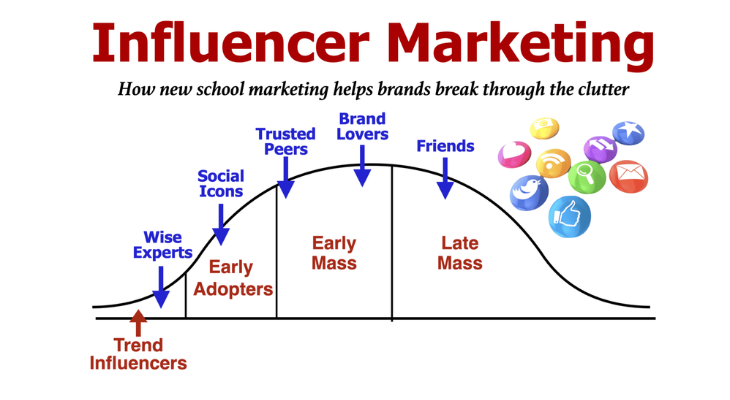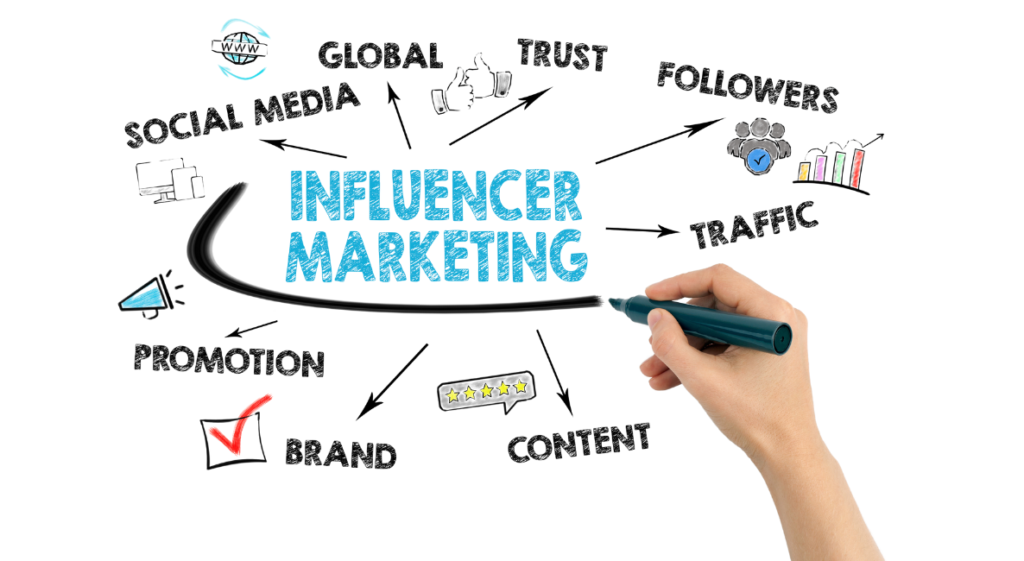The Ultimate Guide to Influencer Marketing: Strategies, Trends, and FAQs

Hey there!Have you ever been curious about the nature of influencer marketing? Well, you’re in the right place! In this comprehensive guide, we’ll delve into the exciting world of influencer marketing, exploring its definition, significance, and everything in between. So, let’s dive in!
Table of Contents
ToggleDefinition of Influencer Marketing:

First things first, let’s demystify influencer marketing. Influencer marketing is a powerful strategy wherein brands collaborate with individuals who have a significant online presence and a loyal following (yes, those Instagram and YouTube stars you adore!). These influencers then promote the brand’s products or services to their engaged audience, driving brand awareness, engagement, and ultimately, sales.
Importance and Growth of Influencer Marketing:
Let me tell you, though—it’s somewhat significant.Influencer marketing has witnessed exponential growth in recent years, and for good reason. With traditional advertising becoming increasingly ineffective, consumers are turning to influencers for recommendations and authentic content. As a result, influencer marketing has become a cornerstone of modern-day advertising strategies, offering unparalleled reach and engagement.
What is Influencer Marketing:
Before we delve deeper, let’s answer the burning question: What exactly is influencer marketing? Simply put, influencer marketing involves collaborating with individuals who have a strong online presence and a dedicated following to promote your brand or products. These influencers, be it Instagrammers, YouTubers, or bloggers, have the power to sway the purchasing decisions of their followers, making them invaluable allies for brands seeking to expand their reach and connect with their target audience.
Influencer Marketing Hub:
In today’s digital marketing, the influencer marketing hub serves as a vital nexus where brands and influencers converge to create impactful campaigns and foster meaningful collaborations. These hubs, whether in the form of online platforms or specialized agencies, play a pivotal role in facilitating and optimizing influencer marketing efforts. Let’s delve deeper into what makes the influencer marketing hub such a game-changer in the world of digital advertising.
- Centralized Platform for Collaboration:Influencer marketing hubs provide a centralized platform where brands and influencers can connect and collaborate seamlessly. These platforms often feature robust search and filtering functionalities, allowing brands to identify influencers whose values align with their own and whose audience demographics match their target market.
- Streamlined Campaign Management:From campaign planning and execution to performance tracking and analysis, influencer marketing hubs streamline the entire campaign management process. Brands can leverage these platforms to set campaign objectives, define KPIs, and track the progress of their campaigns in real-time, ensuring maximum transparency and accountability.
- Access to Diverse Talent Pool:One of the key advantages of influencer marketing hubs is access to a diverse talent pool of influencers spanning various niches, industries, and social media platforms. Whether you’re looking to collaborate with fashion bloggers, fitness enthusiasts, or tech gurus, these hubs offer a wide range of options to suit your brand’s needs and objectives.
- Data-Driven Insights and Analytics:In an era where data reigns supreme, influencer marketing hubs provide brands with invaluable insights and analytics to measure the success of their campaigns. From audience demographics and engagement metrics to conversion rates and ROI, these platforms offer a wealth of data to inform strategic decision-making and optimize future campaigns.
- Expert Guidance and Support:For brands navigating the complex landscape of influencer marketing for the first time, influencer marketing hubs offer expert guidance and support every step of the way. Whether it’s crafting compelling campaign briefs, negotiating contracts, or ensuring compliance with regulatory guidelines, these hubs provide brands with the resources and expertise needed to execute successful campaigns.
Influencer Marketing Agencies:
In the ever-evolving world of influencer marketing, navigating the landscape can be daunting for brands looking to harness its power. That’s where influencer marketing agencies come in. These specialized agencies leverage their expertise, industry connections, and data-driven strategies to help brands identify the right influencers, craft compelling campaigns, and achieve their marketing objectives. So, if you’re looking to take your influencer marketing game to the next level, partnering with an agency might be the way to go.
Key Elements of Influencer Marketing:
Now that we’ve covered the basics, let’s delve into the key elements that make influencer marketing tick.
- Identification of Influencers:Whether you’re targeting social media influencers, micro-influencers, or industry experts, it’s crucial to find individuals whose values align with your brand and who resonate with your target audience.
- Content Creation and Collaboration:Once you’ve identified your dream team of influencers, it’s time to get creative! Collaborate with influencers to create compelling content that showcases your brand in an authentic and engaging way. Whether it’s sponsored posts, brand collaborations, or influencer-led campaigns, the key is to strike the perfect balance between promoting your brand and providing value to your audience.
- Audience Engagement and Trust Building:At the heart of influencer marketing lies the concept of building trust and authenticity with your audience. Encourage influencers to engage with their followers in meaningful ways, whether it’s through Q&A sessions, giveaways, or behind-the-scenes content. By fostering genuine connections with their audience, influencers can effectively promote your brand and drive engagement.
Strategies for Effective Influencer Marketing:
Now that you’re familiar with the key elements of influencer marketing, let’s explore some strategies for success.
- Goal Setting and Target Audience Analysis:Before diving headfirst into influencer marketing, take the time to define your goals and understand your target audience. Whether you’re looking to increase brand awareness, drive website traffic, or boost sales, having clear objectives will guide your influencer marketing strategy and ensure its effectiveness.
- Choosing the Right Influencers:Instead of focusing solely on the number of followers, prioritize influencers who align with your brand values and have a genuine connection with their audience. Whether it’s niche influencers or macro-influencers, finding the right fit is key to maximizing your campaign’s impact.
- Crafting Compelling Content:In the rapidly evolving realm of social media, time is of the essence. To stand out amidst the noise, focus on creating content that is authentic, engaging, and relevant to your audience. Whether it’s captivating visuals, compelling storytelling, or user-generated content, the key is to capture your audience’s attention and keep them coming back for more.
- Leveraging Multiple Platforms:In today’s digital landscape, diversity is key. Instead of putting all your eggs in one basket, leverage multiple platforms to reach a wider audience and maximize your campaign’s reach. Whether it’s Instagram, YouTube, TikTok, or beyond, each platform offers unique opportunities to connect with your audience and amplify your message.
- Measurement and Analysis of Influencer Campaigns:Once your influencer marketing campaign is up and running, it’s essential to track its performance and analyze the results.
- Metrics for Success Evaluation:From reach and engagement to conversion rate and ROI, there are a plethora of metrics to track when evaluating the success of your influencer marketing campaign. By monitoring key performance indicators, you can gain valuable insights into what’s working, what’s not, and how to optimize your future campaigns for success.
- Tools and Technologies for Tracking:Luckily, you don’t have to go it alone when it comes to measuring the success of your influencer marketing campaigns. From analytics platforms to social listening tools to influencer marketing software, there are a host of tools and technologies available to help you track and analyze your campaign’s performance.
- Adjusting Strategies Based on Insights:In the ever-evolving world of influencer marketing, adaptation is key. By analyzing the insights gleaned from your campaign’s performance, you can identify areas for improvement, refine your strategies, and ensure that future campaigns are even more effective.
Challenges and Future Trends in Influencer Marketing:
In the ever-evolving landscape of influencer marketing, there are both challenges to overcome and exciting trends on the horizon. Let’s take a closer look at some of the key challenges facing the industry, as well as emerging trends and innovations to watch out for.
- Rising Competition and Saturation:As influencer marketing continues to gain traction, competition among brands and influencers alike is fiercer than ever. With countless brands vying for the attention of consumers, standing out amidst the noise can be a daunting task. To succeed in this crowded landscape, brands must prioritize authenticity, creativity, and differentiation to capture their audience’s attention and build meaningful connections.
- Regulatory Concerns and Transparency:In recent years, regulatory concerns surrounding influencer marketing have come to the forefront. From the Federal Trade Commission (FTC) guidelines in the United States to similar regulations in other countries, there is increased scrutiny on influencers and brands to ensure transparency and disclosure in sponsored content. Navigating these regulations while maintaining authenticity and credibility is a challenge that brands and influencers must address head-on.
- Audience Skepticism and Trust Issues:With the rise of influencer fraud and fake followers, audience skepticism towards influencer marketing is on the rise. Consumers are becoming increasingly discerning, demanding authenticity and transparency from the influencers they follow. Building and maintaining trust with their audience is a top priority for influencers, requiring genuine engagement and a commitment to ethical practices.
- Emerging Trends and Innovations:Despite the challenges, the future of influencer marketing is bright, with several exciting trends and innovations shaping the industry. From the rise of new social media platforms like TikTok to the growing popularity of virtual influencers and AI-powered campaigns, the landscape is constantly evolving. Brands that embrace these emerging trends and leverage innovative strategies will be well-positioned to stay ahead of the curve and drive meaningful results.
- Focus on Micro-Influencers and Niche Markets:With the saturation of the influencer market, brands are increasingly turning to micro-influencers and niche markets to reach highly targeted audiences. These smaller-scale influencers often have a more engaged and loyal following, making them valuable partners for brands seeking to connect with specific demographics and communities. By harnessing the power of micro-influencers, brands can drive authentic engagement and build stronger relationships with their audience.
- Rising Competition and Saturation:In the dynamic realm of influencer marketing, one of the foremost challenges faced by brands and influencers alike is the escalating competition and market saturation. Let’s explore this challenge in greater detail:
- Increased Number of Players:As influencer marketing gains momentum, the number of brands and influencers entering the arena has surged dramatically. With more players vying for consumer attention, the competition has become fiercer than ever before.
- Crowded Digital Space:The digital space is inundated with an abundance of content, spanning various platforms such as Instagram, YouTube, TikTok, and more. Amidst this deluge of content, breaking through the noise and capturing audience attention has become increasingly challenging for brands and influencers alike.
- Challenges in Standing Out:Differentiating oneself from the competition poses a significant challenge in a saturated market. Brands must devise innovative strategies to distinguish their products or services from similar offerings, while influencers need to find unique ways to engage their audience amidst a sea of content.
- Diminished Impact of Traditional Advertising:The declining efficacy of traditional advertising channels has led to a surge in brands turning to influencer marketing as a means to connect with their target audience. Consequently, the influx of brands leveraging influencer partnerships has contributed to market saturation, making it more challenging for individual influencers to stand out.
- Pressure to Maintain Authenticity:As competition intensifies, there’s a growing pressure on influencers to maintain authenticity and credibility. As audiences get more astute, they look for real connections with influencers who share their interests and values.In such a competitive landscape, maintaining authenticity becomes paramount for influencers to retain their audience’s trust and loyalty.
- Importance of Differentiation:In order to thrive amidst rising competition and saturation, brands and influencers must prioritize differentiation. This entails developing unique value propositions, crafting compelling narratives, and delivering authentic content that resonates with their target audience on a deeper level.
Conclusion:
Influencer marketing has emerged as a dynamic and influential force in the realm of digital advertising, offering brands unprecedented opportunities to connect with their target audience in authentic and engaging ways. Throughout this guide, we’ve explored the definition of influencer marketing, its significance, key elements, strategies for success, challenges, and future trends.
Influencer marketing represents a powerful tool for brands seeking to cut through the noise, build brand awareness, and foster meaningful connections with their target audience in today’s digital age. By embracing creativity, authenticity, and innovation, brands and influencers can unlock the full potential of influencer marketing and shape the future of digital advertising.
FAQs :
What is influencer marketing?
Influencer marketing is a strategic approach wherein brands collaborate with individuals who have a significant online presence and a dedicated following (i.e., influencers) to promote their products or services to a targeted audience. This form of marketing leverages the credibility and influence of these individuals to drive brand awareness, engagement, and ultimately, sales.
What types of content can influencers create?Influencers can create a wide range of content tailored to suit their audience and brand objectives. This includes sponsored posts, product reviews, tutorials, behind-the-scenes glimpses, user-generated content, and more. The key is to collaborate with influencers to develop authentic and engaging content that resonates with their audience while effectively showcasing your brand.
How can I assess whether my influencer marketing efforts are successful?
Measuring the success of influencer marketing campaigns involves tracking key performance indicators (KPIs) such as reach, engagement, conversion rates, and return on investment (ROI). Utilizing analytics platforms, social media metrics, and unique tracking links can provide insights into campaign performance and inform future strategic decisions.
Are there any regulatory guidelines I need to follow in influencer marketing?
Yes, many jurisdictions have regulatory guidelines and disclosure requirements governing influencer marketing to ensure transparency and consumer protection. For instance, the Federal Trade Commission (FTC) in the United States requires influencers to clearly disclose sponsored content using hashtags such as #ad or #sponsored. It’s essential for brands and influencers to familiarize themselves with these regulations and adhere to them accordingly.
How can I ensure authenticity in influencer marketing?
Authenticity is paramount in influencer marketing to foster genuine connections with the audience and build trust. Brands should prioritize collaborating with influencers whose values align with theirs and who can authentically endorse their products or services. Additionally, transparent communication, genuine engagement, and avoiding overly scripted content can help maintain authenticity in influencer partnerships.
What are the emerging trends in influencer marketing?
Some emerging trends in influencer marketing include the rise of micro-influencers and niche markets, the utilization of new social media platforms such as TikTok, the growing popularity of virtual influencers, and the integration of AI-powered campaigns. Staying abreast of these trends and experimenting with innovative strategies can help brands stay ahead of the curve and maximize their impact in influencer marketing.




